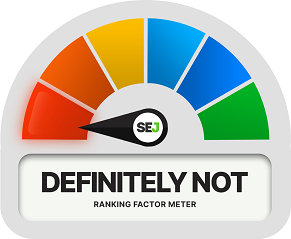Building a diverse portfolio of links is part of a successful link building strategy.
But can the ratio of homepage links you acquire vs. links to other pages impact rankings?
To start off, you should know that this idea is so obsolete that Google uses the words “deep link” to describe something completely different from the myth we’re discussing. It doesn’t consider this idea worth addressing or defining.
This article does not refer to deep links for mobile app users that send them to a specific page within your app. That’s the only mention you’ll see from Google as of 2023.
That should give you a clue as to the conclusion.
[Ranking Factors 2023] Download the free ebook + cheat sheet →
The Claim: Deep Link Ratio Is A Ranking Factor
To determine if deep link ratio is a ranking factor, we must first define deep links.
For the context of this article, deep links are inbound links that point to pages on your website that aren’t your homepage.
Links that take website visitors deep within your website, as opposed to the entry page.
Although Google Ads offers a deep link impact calculator, its intended use is to identify missed opportunities to convert app users with deep links.
The calculator does not determine the deep link ratio in this article.
Regarding ranking factors, the deep link ratio measures the total number of inbound links to every page on your website vs. the total number of inbound links to only your homepage.
Calculating Deep Link Ratio
Let’s say you have 1,584 inbound links to your website. Of those links, 698 are to your homepage.
The remaining 886 are to specific pages on your website.
To calculate your deep link ratio, divide your number of deep links by the total number of inbound links.
886 / 1,584 = 55.9% deep link ratio
The claim is that this percentage would suggest a more natural link profile than a site with 90% of its links to its homepage.
The Evidence For Deep Link Ratio As A Ranking Factor
The Advanced SEO documentation in Google Search Central has a page on link building tactics to avoid.
You won’t find a mention of deep links here, however.
Here’s what Google has suggested:
“The best way to get other sites to create high-quality, relevant links to yours is to create unique content that can naturally gain popularity in the Internet community.
Creating good content pays off: Links are usually editorial votes given by choice, and the more helpful you have, the greater the chances someone else will find that content valuable to their readers and link to it.”
This approach could lead to deep links but doesn’t mention deep links or a ratio.
In 2004, you’ll find one of the first mentions of a deep link ratio from a link building agency. It includes an example of calculating your deep link ratio but no evidence of it being a ranking factor.
In 2006, SEOBook.com published a question about deep link ratio. Similar to the article in 2004, it offers a calculation method to determine your percentage of deep links but no further evidence that it affects your rankings.
A 2006 study on the Link-Based Characterization and Detection of Web Spam correlated many homepage links with “spammier” websites.
It’s essential to build a diverse link portfolio for your website, which includes a mix of homepages and deep links.
But there is no magic ratio of deep links to homepage links.
[Recommended Read] → Ranking Factors: Systems, Signals, and Page Experience
Deep Link Ratio Is Definitely Not A Ranking Factor

Let’s be clear: “deep link ratio” is obsolete terminology, and it’s a mindset you should avoid in SEO. Magic numbers and ratios don’t win rankings.
While links are a confirmed ranking factor, a deep link ratio is not a Google ranking factor.
One thing we know for sure, thanks to Google’s John Mueller, is the total number of inbound links doesn’t matter.
The only thing to consider about deep links to pages on your website is user experience.
If a link to a page other than the homepage would help the user get what they need in the least amount of clicks possible, it’s worth it.
Featured Image: Paulo Bobita/Search Engine Journal





